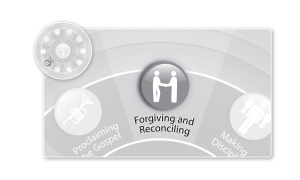 Conditional love, conditional forgiveness–these hardly sound like magnanimous divine traits. In fact, they make God sound rather crusty and petty.
Conditional love, conditional forgiveness–these hardly sound like magnanimous divine traits. In fact, they make God sound rather crusty and petty.
Leave it to David Powlison and Chris Brauns to explain why we should actually be quite delighted and honored that God’s love and forgiveness are, in fact, conditional–conditional on us asking, that is, not earning. As in 1 John 1:9‘s “If we confess our sins, he is faithful and just and will forgive us our sins and purify us from all unrighteousness.”
Powlison’s God’s Love: Better Than Unconditional and Brauns’ Unpacking Forgiveness both explain why divine unconditionality–whether in love or forgiveness–not only makes for bad theology; it promotes bad behavior, bitterness, and not a whole lot of personal growth.
Brauns’ points are nicely distilled in a trio of blog posts that are well worth your time: 5 Problems with Unconditional Forgiveness, Conditional Forgiveness Is Taught by Many Christian Authors and Theologians, and Must Christians Always Forgive? by A.B. Caneday. For the click-reluctant, let me distill the distillation even further and share the key features of Brauns’ argument. Actually, Brauns lets Caneday carry the systematic freight:
Caneday unfolds the biblical logic for conditional forgiveness. Caneday reasons:
1. Forgiveness always concerns sin.
2. God forgives confessed sin.
3. God’s forgiveness correlates to our forgiveness.
4. Our forgiving must be like God’s forgiving of our sins.
5. God’s forgiveness of sin is for the repentant and so is ours.
6. Not to grant forgiveness of sins to the unrepentant is not the same as being unforgiving
He hastens to add this helpful clarification from Caneday, lest anyone think that the conditionality of forgiveness means that we get to choose whatever conditions we want to set when it comes to others seeking forgiveness from us:
One of the more helpful distinction Caneday makes is his point that, “Not to grant forgiveness of sins to the unrepentant is not the same as being unforgiving.” Hence, Caneday stresses, “We must always be ready to forgive, eager to forgive, praying that the Lord would grant repentance to the unrepentant person in order that both he and we may grant forgiveness of sins.” (p. 16)
The phraseology of Adams is helpful here, whom Brauns quotes at length in another post:
You are not obligated to forgive an unrepentant sinner, but you are obligated to try to bring him to repentance. All the while you must entertain a genuine hope and willingness to forgive the other and a desire to be reconciled to him or her. Because this biblical teaching runs counter to much teaching in the modern church, it is important to understand it. Such forgiveness is modeled after God’s forgiveness which is unmistakably conditioned on repentance and faith.
So why is it good news that God seeks us out in order to extend forgiveness to us but waits to grant it until we ask for it?
Because it shows once again the amazing amount of respect and honor God accords to us dishonored (and dishonorable) creatures. He doesn’t wait for us to seek him out, arms crossed. He doesn’t make us beg. He doesn’t lay out hoops through which we must jump. But he does respect our freedom. If we persist in sinful behavior and refuse to repent from it because we’re perfectly content in our rebellion, he does not forgive us when we don’t see ourselves as in the wrong. What a gracious maker. Far from being crusty, his conditional love is actually far more freedom-affirming than the vapid theological saw of him swatting out of our hands that which we cling to so tenaciously in our rebellion against him.
And what good sense that we would obey him in forgiving others that same way. We too are to diligently, frequently, lovingly seek out those who have wronged us. We too are to call them tenderly to repentance. We too are to intercede for them with the father. And we too are to let them know that we are ready to forgive them because of the lavish goodness and healing that God has already extended to us.
But forgive them for what they stubbornly insist is not wrong? How does that affirm their agency, convey respect to them and to God, and set the stage for true healing of broken relationship?
It turns out that, truth be told, restoration of relationship isn’t really what many of us want in forgiveness. We simply want the messiness, brokenness, and guilt to be swept away like broken glass off the kitchen floor–a point Brauns makes well when he notes that Unconditional forgiveness removes the urgency of being reconciled with the offending party:
If forgiveness is a private affair, then there is no need to ever interact directly with the one who has caused the injury. It is not uncommon to hear someone say, “I have forgiven her, but I will never talk to her again.” Such an approach does not embody the forgiveness granted by the Lord who welcomes sinners into His loving arms.
In the end, that’s the crusty, petty thing about supposedly unconditional forgiveness: It produces fairyland faux relationships, not gritty, deep, hold-on-tight-and-we’ll-go-the-distance-together authentic reconciliations. In Powlison’s words, God does “better than unconditional.” That’s because Scriptural forgiveness is always about enduring relationships centered on the Cross. We are forgiven into such relationships, not out of them.










